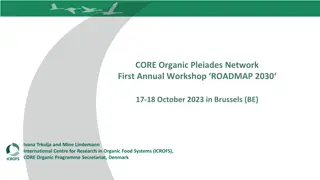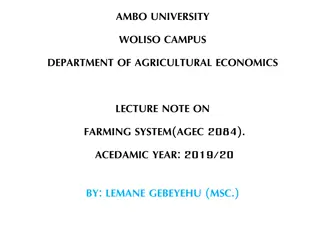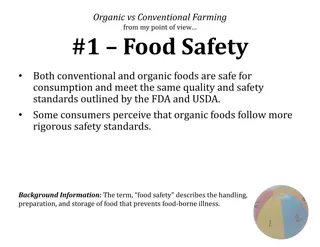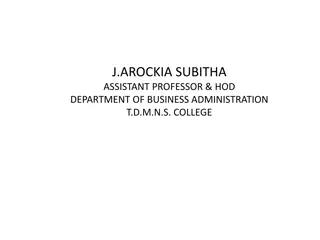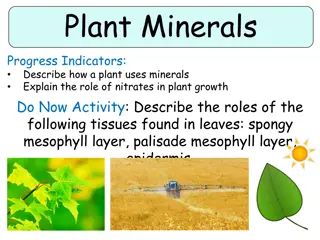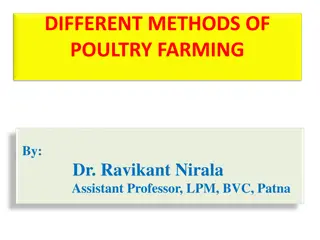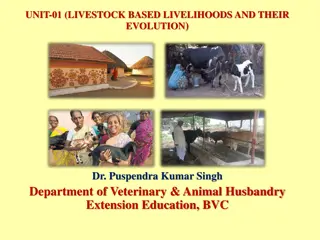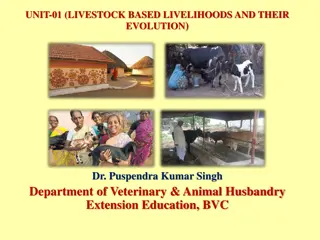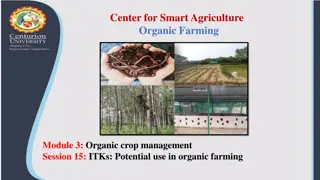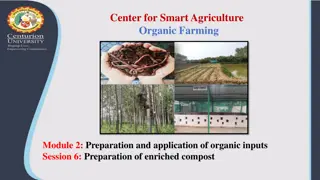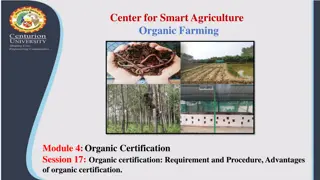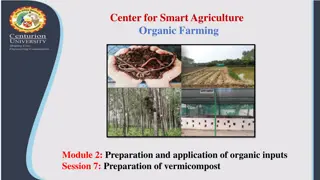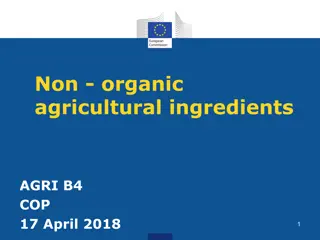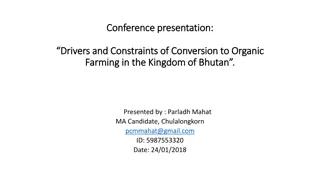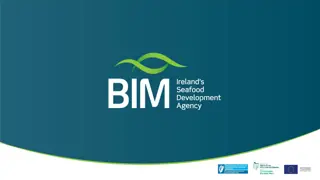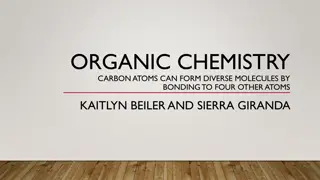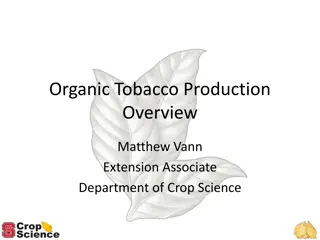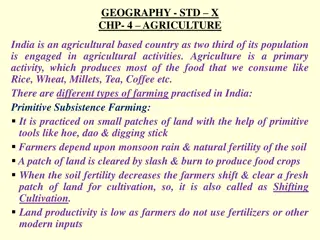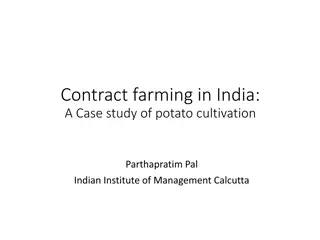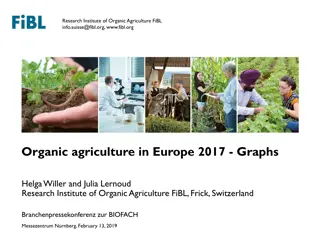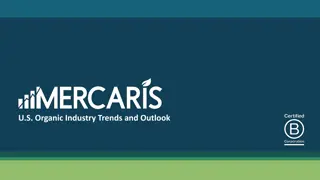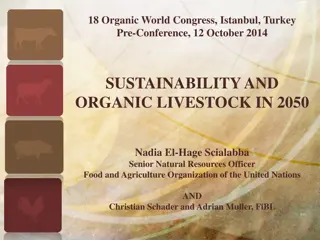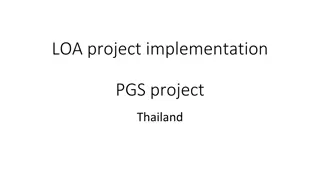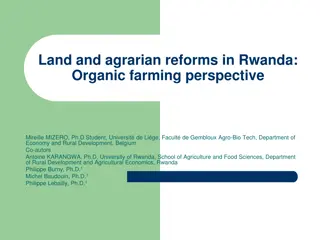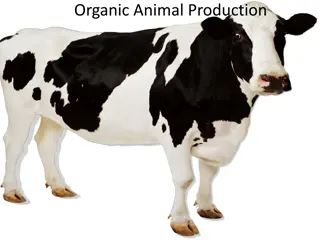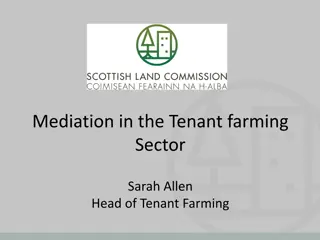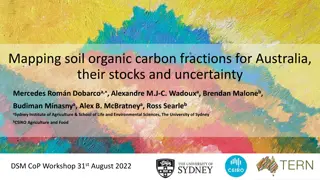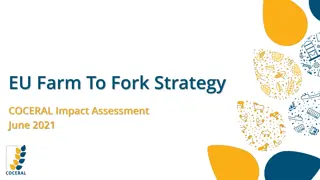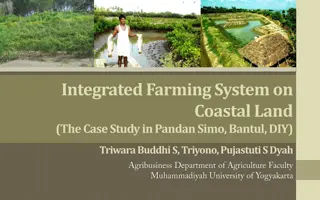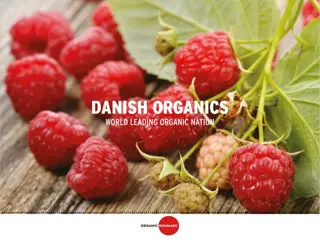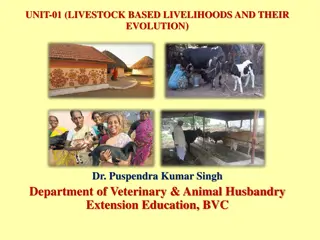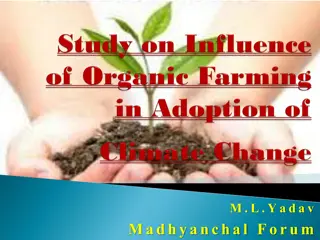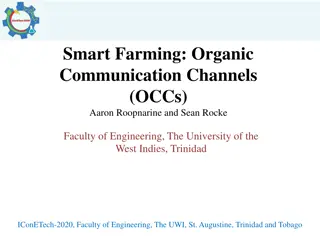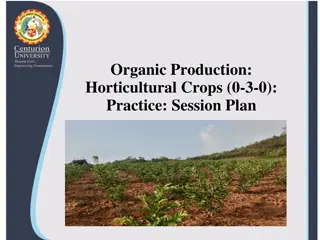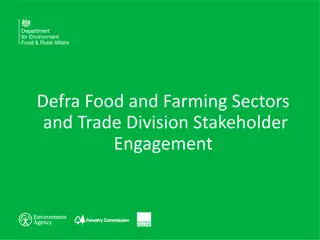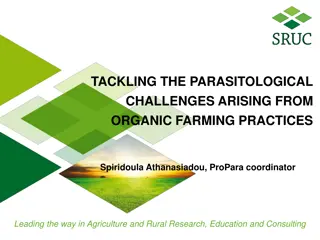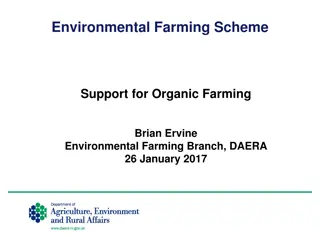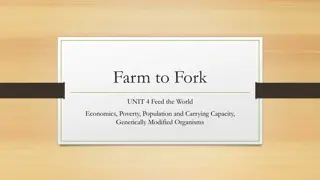CORE Organic Pleiades Network First Annual Workshop Roadmap 2030 - Event Recap
The CORE Organic Pleiades Network held its first annual workshop in Brussels, focusing on organic research and innovation in the European agri-food sector. The event discussed HEU partnerships, national/regional action plans, research funding, and more. CORE Organic aims to enhance knowledge and inn
0 views • 37 slides
Understanding Farming Systems in Agricultural Economics
Concepts of farming systems research and development are crucial for effective agricultural management. A farming system encompasses various components that work together to achieve specific objectives. It involves the arrangement and management of farming enterprises in response to environmental fa
0 views • 49 slides
Organic vs Conventional Farming: An Overview
In the debate between organic and conventional farming, both methods have their pros and cons. While organic foods are perceived to follow stricter safety standards, both types meet FDA and USDA regulations. They offer similar nutritional value, but organic farming tends to have lower efficiency due
0 views • 6 slides
Entrepreneurial Opportunities in Agriculture: Diversification, Organic Farming & More
Explore diverse entrepreneurial opportunities in agriculture such as diversification, organic farming, food preservation, processing, and packaging, floriculture, and production of agro-inputs. Discover how entrepreneurs can leverage these sectors to create profitable ventures and contribute to sust
0 views • 8 slides
Plant Minerals and Farming Methods
Learn about how plants use minerals for growth, the role of nitrates, different leaf tissues, mineral deficiencies, and farming methods to ensure crop yield. Discover how plants obtain minerals from the soil, symptoms of mineral deficiencies, and the importance of fertilizers in farming. Explore dif
0 views • 13 slides
Diverse Methods of Poultry Farming and Agricultural Practices
Poultry farming practices such as organic farming, nitrogen fixation, biodiversity management, and contract farming are discussed. Organic farming emphasizes holistic relationships in agriculture, promoting sustainable production. Nitrogen fixation and biodiversity management play essential roles in
0 views • 20 slides
Evolution of Livestock-based Livelihoods and Capitalistic Farming Systems
Livestock-based livelihoods have evolved over time, with capitalistic farming systems emerging as prominent in regions like South America, North America, and Europe. These systems are characterized by individual entrepreneurs controlling farming activities. Plantations are a common example of capita
0 views • 10 slides
Livestock-based Livelihoods and Farming Systems Evolution
Livestock-based livelihoods and farming systems have evolved over time, aiming to produce food and crops sustainably. Small-scale farming, farm management, types of farming, and various farming systems like specialized and diversified farming play key roles in enhancing productivity, profitability,
9 views • 19 slides
Indigenous Technical Knowledge in Organic Farming: Sustainable Practices and Nutrient Management
Indigenous Technical Knowledge (ITK) plays a crucial role in organic farming by providing sustainable practices passed down through generations. Farmers in regions like Orissa, West Bengal, Tamil Nadu, and Rajasthan utilize ITK for nutrient management, intercropping, green manuring, and addressing a
0 views • 8 slides
Enhancing Compost Quality for Organic Farming: Phosphorous-Enriched Compost Preparation
Composting is a natural process crucial for organic farming. Enriched compost improves nutrient supply to crops. Learn how to prepare phosphorous-enriched compost using organic wastes, bio-inoculants, and rock phosphate. Follow a method involving layering organic materials, cow dung, and rock phosph
3 views • 8 slides
Contract Farming in India: A Case Study of Potato Cultivation
Value addition in Indian agriculture is low due to poor processing levels. Contract farming is being considered to integrate agriculture production into the global value chain, but concerns about unequal bargaining power between farmers and corporations exist. Various forms of contract farming exist
0 views • 26 slides
Understanding Organic Certification and NPOP in India
Organic certification is crucial for ensuring the quality and authenticity of organic products. This involves adhering to strict production standards and undergoing periodic inspections. In India, the National Programme on Organic Production (NPOP) plays a significant role in certifying organic comm
0 views • 10 slides
Vermicomposting: Organic Farming with Earthworms
Vermicomposting is a sustainable method of converting organic waste into nutrient-rich compost using earthworms. This process involves preparing organic materials, creating a vermi bed, and layering substrates for the worms to decompose. Different earthworm species are utilized for vermicomposting,
0 views • 9 slides
Concerns and Recommendations on Non-Organic Agricultural Ingredients
Various Member States express concerns about the inclusion of new non-organic agricultural ingredients in Regulation 889/2008 Annex IX, emphasizing the need to maintain the integrity of organic production. Suggestions include keeping the list as short as possible, searching for organic alternatives,
0 views • 19 slides
Exploring Drivers and Constraints of Conversion to Organic Farming in Bhutan
Population in Bhutan heavily relies on agriculture, but the transition to organic farming has been slow despite the desire to reduce chemical use. This presentation investigates the current state of organic farming, identifies key factors affecting conversion, and offers policy recommendations to pr
0 views • 22 slides
Overview of Global Farmed Salmon and Organic Production
The data showcases the production figures for global farmed salmon across various countries, with Norway leading the production, followed by Chile, Scotland, and others. Additionally, insights into the growing organic salmon production, vulnerabilities in the sector, and details on organic mussels p
0 views • 9 slides
Understanding Organic Chemistry: Carbon Atoms and Molecular Diversity
In organic chemistry, carbon atoms can form diverse molecules by bonding to four other atoms, leading to molecular complexity and diversity. The versatile nature of carbon allows for the formation of various carbon skeletons, contributing to the vast array of organic compounds. Hydrocarbons, consist
0 views • 12 slides
Guide to Organic Tobacco Production Process
Understand the process of organic tobacco production including obtaining a contract, certifying land, inspections, maintaining certification, selling leaf, and transitioning from conventional to organic production. Get insights on organic certification through USDA-National Organic Program, required
0 views • 18 slides
Agricultural Practices and Major Crops in India
India is predominantly an agricultural-based country with two-thirds of its population engaged in farming. The country practices different types of farming, including primitive subsistence farming, intensive subsistence farming, and commercial farming. The cropping seasons in India are classified as
0 views • 8 slides
Contract Farming in India: Enhancing Agricultural Value Chain Through Partnerships
Value addition in Indian agriculture has been low due to limited processing levels. Contract farming is emerging as a viable solution to integrate agriculture production into the global value chain, albeit with concerns about unequal bargaining power. Various forms of contract farming exist, with ex
0 views • 26 slides
Overview of Organic Agriculture in Europe 2017
Europe has seen a significant increase in organic farmland and retail sales in 2017. With 2.9% of Europe's farmland being organic, totaling 14.6 million hectares, countries like Spain, Italy, and France lead in organic farming. In terms of retail sales, Denmark and Switzerland stand out with high pe
0 views • 9 slides
Challenges in Promoting Organic Farming in India
The agro-ecological movement in India faces challenges in scaling up organic farming due to limited government support, lack of scientific consensus, and reliance on chemical-intensive agriculture. Despite some initiatives like the Paramparagat Krishi Vikas Yojana, implementation remains suboptimal.
0 views • 35 slides
Insights into U.S. Organic Industry Trends and Outlook
The U.S. organic industry is experiencing positive consumer demand growth, with organic food sales reaching $56 billion in 2020. Despite a decline in organic dairy sales, the overall organic acreage growth remains strong. The market faces challenges such as the impact of COVID-19, the need for produ
0 views • 12 slides
Sustainability and Organic Livestock Modeling for Global Food Security
The research presented at the 18th Organic World Congress in Istanbul delves into the Sustainability and Organic Livestock (SOL-m) modeling approach developed by FAO and FiBL. The study aims to explore the potential impacts of global conversion to organic livestock production by 2050 on food securit
0 views • 25 slides
Promoting Participatory Guarantee Systems (PGS) for Small Scale Organic Farming in Thailand
The project aims to strengthen organic agriculture communities in Thailand through the establishment of Participatory Guarantee Systems (PGS) as an alternative to third-party certification. PGS advocates for market and government recognition, focusing on quality assurance, trust, and knowledge excha
0 views • 13 slides
Land and Agrarian Reforms in Rwanda: Organic Farming Perspective
Land reform policies in Rwanda have been crucial for optimal land resource utilization, conflict resolution, and equity promotion. Since 2004, there have been significant changes focusing on systematic land registration, asset transaction facilitation, and efficiency through specialization. Organic
0 views • 23 slides
Organic Animal Production in the US: Insights and Statistics
Organic animal production in the US involves raising livestock and poultry through natural practices without antibiotics or hormones. Animals are fed organic feed and have access to outdoor spaces to mimic natural behavior. Statistically, over 5 million acres of land are certified for organic animal
0 views • 19 slides
Enhancing Mediation in the Tenant Farming Sector
Sarah Allen, Head of Tenant Farming, leads initiatives to promote mediation in the tenant farming sector, aiming to improve relationships between landlords and tenants. The Tenant Farming Commissioner under the Land Reform Act 2016 encourages mediation for resolving complex disputes. The pilot media
0 views • 9 slides
Mapping Soil Organic Carbon Fractions in Australia: Stocks and Uncertainty
This study by Mercedes Román Dobarco et al. focuses on mapping soil organic carbon fractions across Australia, including mineral-associated organic carbon, particulate organic carbon, and pyrogenic organic carbon. The research involves prediction of soil organic carbon fractions using spectral libr
0 views • 17 slides
EU Farm To Fork Strategy and COCERAL Impact Assessment
The European Commission proposes ambitious targets including transforming 10% of agricultural land for high diversity landscapes, increasing organic area to 25%, reducing fertilizer and pesticide use by 20% and 50% respectively. COCERAL's impact assessment aims to quantify the effects on the EU arab
0 views • 13 slides
Integrated Farming System on Coastal Land: A Case Study in Pandan Simo, Bantul, DIY
The coastal area in Pandan Simo, Bantul, is embracing integrated farming systems combining food crops, horticulture, and livestock due to diminishing agricultural land. Farming on marginal lands like beaches has become a prevalent alternative. This case study aims to assess farming feasibility and r
0 views • 10 slides
The Danish Model: Driving Organic Breakthrough & Market Growth
The Danish Model showcases the political and market mobilization behind the organic breakthrough in Denmark. Organic Denmark focuses on driving market growth through political policy, consumer motivation, innovation on farms, and strategic work with retailers and food services. The country has exper
0 views • 39 slides
Evolution of Livestock-Based Livelihoods: From Estate Farming to Specialized Crop Cultivation
Estate farming, a form of industrialized agriculture introduced by the British in the 19th century, involves large monocultures of cash crops like tea, rubber, and spices. It requires significant investment in modern farming techniques, machinery, and skilled labor. Estate farming is capital-intensi
0 views • 8 slides
Study on Climate Change and Organic Farming Impact by Madhyanchal Forum
Madhyanchal Forum conducted a study on the impact of climate change on agriculture and the effectiveness of organic farming in mitigating climate change. The study involved various organizations and farmers across different regions, focusing on the adoption of sustainable farming practices. Detailed
0 views • 16 slides
Exploring Organic Communication Channels for Smart Farming Applications
Smart Farming research at The University of the West Indies focuses on Organic Communication Channels (OCCs) using vegetation-based media to transmit data for cyber-physical systems. The study aims to establish the feasibility and infrastructure for OCCs, including static channel characterization an
0 views • 13 slides
Organic Seed Treatment Techniques for Improved Horticultural Crop Production
Explore the benefits of organic seed treatment methods for horticultural crops, such as priming, pelleting, and seed health treatments. Learn how these techniques can enhance germination rates, protect against pathogens, and optimize planting accuracy in organic farming practices.
0 views • 14 slides
Sustainable Farming Incentive Stakeholder Engagement Meeting
The meeting hosted by Defra's Food and Farming Sectors and Trade Division aims to gather feedback on the Sustainable Farming Incentive pilot standards and payment processes. Stakeholders in the Arable Sector can provide expert input to shape the development of the program, ensuring farmers' active p
0 views • 20 slides
Innovations in Parasite Control for Organic Farming
ProPara is dedicated to optimizing parasite control strategies for organic farms through targeted research and innovative tools. By generating data, evaluating implementation strategies, and collaborating with key stakeholders, ProPara aims to enhance animal health and welfare in organic farming pra
0 views • 19 slides
Organic Farming Support Program Overview
This overview highlights the Environmental Farming Scheme's support for organic farming, including conversion and management options, eligibility criteria, payment rates, and digressive payments. The scheme aims to increase biodiversity, improve soil quality, enhance water quality, and promote clima
0 views • 13 slides
Sustainable Agriculture: Feeding the World and Future Farming Practices
Explore the dynamics of farming from rural to urban settings, understanding factors like supply and demand, seasonal eating, and sustainable agriculture practices through the lens of economic, poverty, and population considerations. Discover how different farming practices meet market demands, how r
0 views • 55 slides
